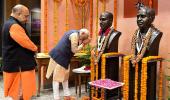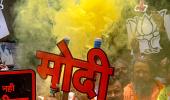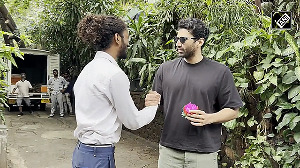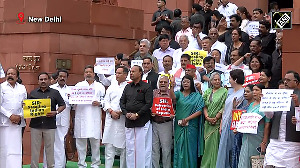The colour has been rendered to activities that would have astonished Swami Vivekananda, says Sunanda K Datta Ray.
Illustration: Dominic Xavier/Rediff.com
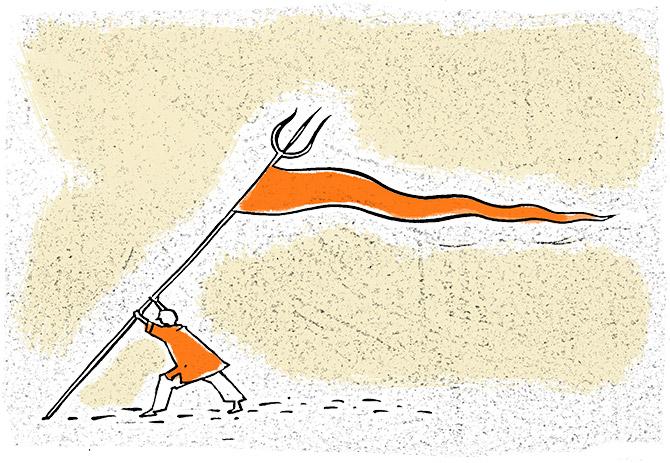
The censors forced Utpal Dutt to re-shoot some scenes in his film Ghoom Bhangar Gaan so that it was clear the goons attacking factory workers who hadn't been paid their wages were not Congressmen.
He had to replace what might have been mistaken for Gandhi caps on their heads with the headgear of a private company's security guards replete with the company's badge of which a close-up had to be shown.
Today's censors would probably be equally solicitous about saffron.
But for the comparison to be valid it must also be made clear that in the absence of any rigorous all-India Hindu authority, anyone is at liberty to wrap himself in saffron.
What was once the colour of purity is now the badge of a particular brand of politics.
Adityanath, Uma Bharti, Pragya Singh Thakur, who is an accused in the 2008 Malegaon bombings, and Ramdev of Patanjali Ayurved Ltd have taken the colour to activities that would have astonished Swami Vivekananda.
Nor would Vivekananda have regarded 'sant' and 'saint' as synonymous, as many sants seem to do.
They have been a power in the land since May 18, 2014 which Britain's Guardian wrote, would 'go down in history as the day when Britain finally left India'.
It wasn't a dirge for the passing of the Raj which would have been unthinkable for a left-liberal anti-monarchy newspaper.
The Guardian exulted that Narendra Damodardas Modi's triumph marked 'the end of a long era in which the structures of power did not differ greatly from those through which Britain ruled the sub-continent' because 'India under the Congress was in many ways a continuation of the British Raj by other means'.
There was some truth in that for the methods, processes and institutions of effective and orderly administration remain the same when the political authority changes.
But in its innocent idealism, The Guardian failed to realise that the return to the grassroots it exalted could mean the end of rational thinking and a victory for the prejudices, superstitions and myths that sustain the impoverished and uneducated multitudes.
I recall a public discussion where a retired army general stormed in angrily to complain that unruly processions had delayed his journey by three hours.
"Is this democracy?" he shouted in exasperation.
"That's exactly what it is!" I explained from the platform.
Two Greek words, demos, (the people) and kratein (to rule) make up the word democracy.
What the general wanted was efficient management.
That is not necessarily anti-democracy, but the two go together only when the people -- the beneficiaries of democracy -- recognise the merit of discipline and voluntarily practise it.
They cannot do so without education, an adequate income, a decent standard of living and a sense of security.
Security does not come from flamboyant boasting about 'surgical strikes' against Pakistan.
It comes from a stable peace which, in turn, demands wise governance and constructive diplomacy, in addition to economic well-being.
Disciplined democracy will remain elusive if instead of setting an example, the political leadership panders to the masses by adopting its worst instincts and values.
Public havans and pujas are as characteristic of that backwardness as lynching, ghar wapsi, attacks on churches, love jihad vigilantes and gau rakshaks.
Namdeo Das Tyagi, better known as Computer Baba, complains that the 'saffron brigade (meaning the Rashtriya Swayamsevak Sangh and Bharatiya Janata Party) has only exploited sadhus and nothing else'.
He should know.
A man for all seasons, Computer Baba sports both saffron and white.
He was a junior minister under the BJP's Shivraj Singh Chouhan, sought an Aam Aadmi Party nomination in 2014, and was appointed chairman of the Ma Narmada, Ma Kshipra and Ma Mandaknini River Trust by Madhya Pradesh's current Congress Chief Minister Kamal Nath.
Winston Churchill, that arch-imperialist whom Indians love to hate, didn't mean it as a compliment when he declaimed in the House of Commons during the debate on the Indian Independence Bill that 'Indian political parties and political classes do not represent the Indian masses'.
Thank heavens they didn't in those days.
Shyama Prasad Mukherjee or K M Munshi wouldn't have dreamt of strutting around in monogrammed suits.
Nor would the civilised C Rajagopalachari or erudite Sarvepalli Radhakrishnan obscenely abuse or invent lies about a prime minister who was cruelly murdered at the height of promise.
Political leaders like Abul Kalam Azad or John Mathai, to pick two members of the Constituent Assembly at random, were men of education, refinement and sensibility for whom politics was a mission.
Under their successors, majority rule is becoming indistinguishable from mob rule.


